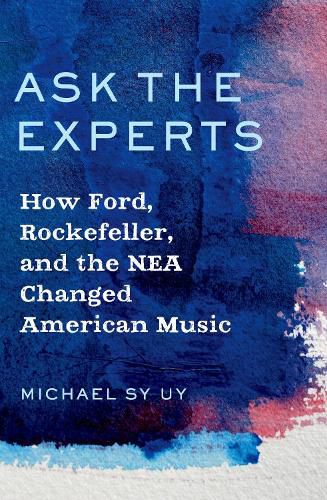Readings Newsletter
Become a Readings Member to make your shopping experience even easier.
Sign in or sign up for free!
You’re not far away from qualifying for FREE standard shipping within Australia
You’ve qualified for FREE standard shipping within Australia
The cart is loading…






From the end of the Second World War through the U.S. Bicentennial, the National Endowment for the Arts, the Rockefeller Foundation, and the Ford Foundation granted close to $300 million (approximately $2.3 billion in 2017 dollars) in the field of music alone. In deciding what to fund, these three grantmaking institutions decided to "ask the experts," adopting seemingly objective, scientific models of peer review and specialist evaluation. They recruited music composers at elite institutions, professors from prestigious universities, and leaders of performing arts organizations. Among the most influential expert-consultants were Leonard Bernstein, Aaron Copland, Lukas Foss, and Milton Babbitt.The significance was two-fold: not only were male, Western art composers put in charge of directing large and unprecedented channels of public and private funds, but in doing so they also determined and defined what was meant by artistic excellence. They decided the fate of their peers and shaped the direction of music-making in this country. By asking the experts, the grantmaking institutions produced a concentrated and interconnected field of artists and musicians. Officers and directors utilized ostensibly objective financial tools like matching grants and endowments in an attempt to diversify and stabilize applicants' sources of funding, as well as the number of applicants they funded. Such economics-based strategies, however, relied more on personal connections among the wealthy and elite, rather than local community citizens. Ultimately, this history demonstrates how "expertise" served as an exclusionary form of cultural and social capital that prevented racial minorities and non-dominant groups from fully participating.
$9.00 standard shipping within Australia
FREE standard shipping within Australia for orders over $100.00
Express & International shipping calculated at checkout
Stock availability can be subject to change without notice. We recommend calling the shop or contacting our online team to check availability of low stock items. Please see our Shopping Online page for more details.
From the end of the Second World War through the U.S. Bicentennial, the National Endowment for the Arts, the Rockefeller Foundation, and the Ford Foundation granted close to $300 million (approximately $2.3 billion in 2017 dollars) in the field of music alone. In deciding what to fund, these three grantmaking institutions decided to "ask the experts," adopting seemingly objective, scientific models of peer review and specialist evaluation. They recruited music composers at elite institutions, professors from prestigious universities, and leaders of performing arts organizations. Among the most influential expert-consultants were Leonard Bernstein, Aaron Copland, Lukas Foss, and Milton Babbitt.The significance was two-fold: not only were male, Western art composers put in charge of directing large and unprecedented channels of public and private funds, but in doing so they also determined and defined what was meant by artistic excellence. They decided the fate of their peers and shaped the direction of music-making in this country. By asking the experts, the grantmaking institutions produced a concentrated and interconnected field of artists and musicians. Officers and directors utilized ostensibly objective financial tools like matching grants and endowments in an attempt to diversify and stabilize applicants' sources of funding, as well as the number of applicants they funded. Such economics-based strategies, however, relied more on personal connections among the wealthy and elite, rather than local community citizens. Ultimately, this history demonstrates how "expertise" served as an exclusionary form of cultural and social capital that prevented racial minorities and non-dominant groups from fully participating.